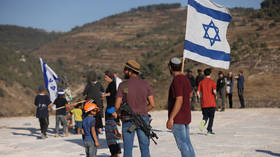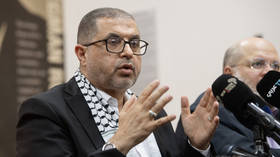Obscured by the fog of the Gaza war, Palestinians face a different threat
The hardline Israeli government is pushing for the annexation of occupied land as the world’s attention is focused elsewhere

As the bulk of the media’s attention is directed at the horrifying war in Gaza, Israel has deployed more troops to the West Bank, while constructing more sections of a separation wall and setting up new checkpoints. Coupled with settlement expansion, this will mean a weakening the territory’s economy, and could lead to a larger confrontation between Palestinians and Israelis.
Even though Israel’s separation wall was deemed to be in contravention of international law, as per an International Court of Justice (ICJ) advisory opinion issued in 2004, Israel has continued to construct the barrier on Palestinian territory. Since the outbreak of the war in Gaza on October 7, Israel has silently continued its construction of the wall in the northern West Bank. According to Israeli human rights group B’Tselem, 86% of the separation barrier is inside the West Bank, de facto annexing 10% of the occupied territory.
Israeli Prime Minister, Benjamin Netanyahu, decided to continue the construction of separation barriers in 2009, arguing that it provided “security” and prevented Palestinians from entering Israel without a permit, effectively isolating over 150 West Bank communities into “islands”, while serving as a guard wall for illegal settlements. The UN human rights chief, Volker Turk, recently stated that Israeli settlements are expanding at record rates. While the US government recently responded to Israel’s announcement that they will build more illegal settler units by saying this is inconsistent with international law, nothing tangible has been done to punish the top US ally in the Middle East.
Widely ignored in the international media has been the recent construction work on a cement wall, to replace what was formerly a military fence placed inside the northern portion of the Tulkarem governorate in the West Bank. It should be noted that Tulkarem, more specifically the Nour al-Shams refugee camp in the area, has been a flashpoint for Israeli military raids and a location from which locally formed armed groups have used light weapons to confront those invading forces.
Another location where Israel has been constructing a new segment of its separation wall is in the West Bank governorate of Jenin. The structure's construction is continuing to the west of the northern West Bank city, and situated right behind it is an Israeli highway, followed by a settlement. Although Israel had already constructed a militarized fence in the area, to divide Palestinians from Israelis, erecting the wall on Palestinian land quite literally cements the annexation of the territory.
Yet, it is not only the Israeli separation wall and newly announced settlement expansion which is impacting the status quo inside the West Bank. The Israeli military has set up an unprecedented number of gates, dirt mounds, and other obstacles, to block roads throughout the occupied territory. In Palestinian villages surrounding the city of Ramallah for instance, Israeli forces set up 28 gates in a single day following the outbreak of war in Gaza. While there is often the most attention placed upon around 100 permanent checkpoints in the occupied territory, with temporary checkpoints bringing that total into the thousands yearly, roadblocks and gates can have an even more strangling effect on daily life for Palestinian residents.
As a result of the closure of gates, and roads with dirt mounds or cement blocks, Palestinians living inside villages or towns are effectively isolated from the rest of the territory. Instead of being able to travel in cars to their jobs, or to transport goods like foods or agricultural products, they are restricted to traveling on foot. Sometimes residents stay home altogether, especially when Israeli soldiers are present and they fear persecution at crossings out of their villages. Some of the worst areas for such closures are situated in the Southern West Bank governorate of al-Khalil (Hebron).
Ubai al-Aboudi, the executive director of Palestinian rights group ‘Bisan Center’, told RT that due to Israeli measures in the West Bank since October 7, “unemployment rates have increased dramatically, we have seen a huge number of Palestinians that are not able to provide food for their families”. He added that “what we have seen is a doubling of the number of Palestinians that are food insecure in the West Bank, there were 300,000 before October 7 and now there are 600,000”.
In February, the Israeli Knesset voted through a bill that backed Prime Minister Benjamin Netanyahu’s voiced rejection of any unilateral recognition of a Palestinian State. This has again revived fears of a major de-jure annexation by Israel of areas inside the West Bank. The Netanyahu cabinet, in December 2017, managed to pass a bill which ordered the government to begin working to implement an annexation plan. Beginning in early 2023, the current Israeli ruling coalition began quietly handing over areas of the West Bank that were formerly under military control to civilian control.
According to Ubai al-Aboudi, the separation wall, gates and checkpoints are all components of Israel’s overarching plan to confiscate more Palestinian land: “The Apartheid wall has never been to do with security measures, but rather a means to steal more Palestinian lands and to exert and continue its control over the Palestinian population. The new parts of the wall that are being built are intended to confiscate land, they declare areas as “no access zones” close to the wall and this allows them to push back the people and take control of more territory.”
Under the cover of the Gaza war, while the cameras were focused elsewhere, Israeli state-backed settler groups called “defense squads” have expelled some 16 different Palestinian communities in the South Hebron Hills area. In addition to this, entire villages have been invaded and the populations displaced by settlers, drawing comparisons to the 1948 Nakba (ethnic cleansing of Palestine). At least 427 Palestinians have also been killed in the West Bank since October 7, according to the Palestinian Health Ministry while the number of Israeli soldiers operating inside the territory is now larger than the invading force present in Gaza. In fact, the Israeli military even transferred its elite Duvdevan unit from Gaza into the West Bank back in January.
When asked what has changed in terms of the environment of violence in the West Bank since the beginning of the Gaza war, Ubai al-Aboudi shared the following:
“Look, before October 7 there were 235 Palestinians killed in the West Bank that year, which was a record when compared to previous years. So, can I say that the Israeli forces have become more cruel or committed more violence? I’d say that they have been more open in their acceptance of violence, the army has lost its checks and balances in their system, and it has been more tolerated that Israeli settlers and soldiers attack Palestinians. Is this something completely out of the norm? No. Israeli soldiers and settlers have been attacking Palestinians since the start of the occupation, what has changed here is that they’ve lost control over the situation and the rate of attacks has intensified.”
As Israeli forces disrupt daily life for the Palestinian residents of the West Bank, with the construction of new walls, checkpoints, gates and road blocks, the armed confrontations between Palestinian localized armed groups and Israeli forces continue. If the rate of settlement expansion, settler violence and raids which aim at destroying infrastructure inside Palestinian refugee camps, is to be coupled with the economic decline that has come as a byproduct of Israeli aggression, it makes for a tough year ahead in the occupied territory. The US government asserts its position as favoring a Two State solution, yet the Israeli government’s actions inside the West Bank are making this solution even more impossible than prior to October 7. All of this occurs under the fog of war, where unprecedented measures are tolerated in the West Bank, as the international community fixates on Gaza.
The statements, views and opinions expressed in this column are solely those of the author and do not necessarily represent those of RT.
https://www.rt.com/news/595350-israeli-settlements-escalate-palestinian-territories/


0 Comments:
Post a Comment
Subscribe to Post Comments [Atom]
<< Home